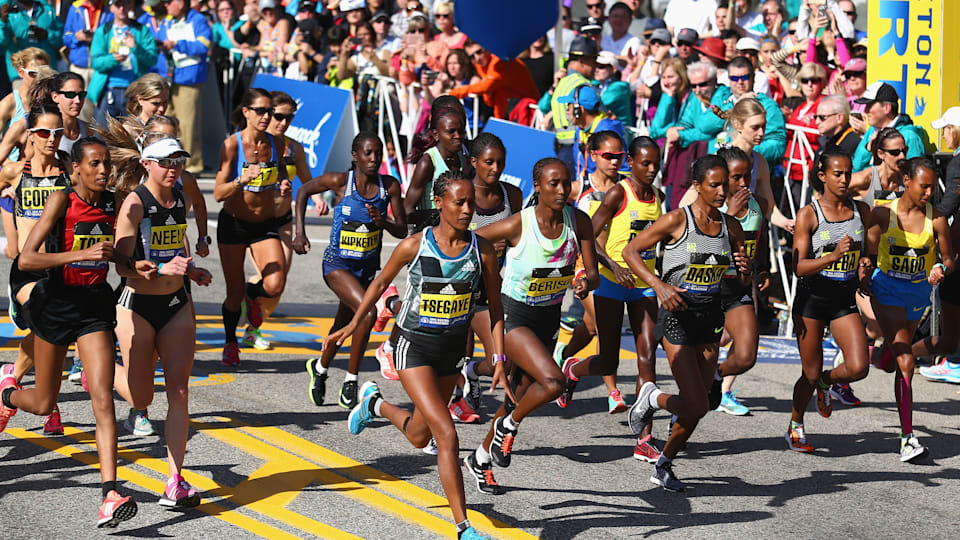
The Athens 1896 Olympic Games were the inspiration behind the inaugural Boston Marathon a year later.
British-born sprinter and Boston Athletics Association (BAA) track coach John Graham, who managed Team USA at that Games, was so enamoured by the 26.2 miles (42.195 km) race, that he decided to organise one back in his hometown.
It has remained a permanent feature in the sporting calendar ever since, and the only time it was cancelled was in 2020 due to the pandemic.
Below, we take a closer look at the history behind the world’s oldest marathon, how it has evolved over the years, and a list of previous winners.
The first Boston Marathon race
Graham joined up with Boston businessman Herbert H.Holtom and planned the first-ever marathon run in the USA - a 24.5-mile course (39.4km).
On 19 April 19 1897, New Yorker John J. McDermott beat a field of 15 men to win the first edition of the Boston Marathon - which was then known as the BAA road race**.**
McDermott took the lead at about 19km in the race and held on to win in 2:55:10, which was three minutes and 40 seconds faster than Spyridon Louis’ winning time from the 1896 Olympics.
The 1898 edition was won by a Canada's Ronald MacDonald, who was studying at Boston College.
Between 1897 and 1968, the BAA decided to hold the Boston Marathon on April 19 to mark Patriots Day - which is only observed in Massachusetts and Maine - commemorating the start of the Revolutionary War.
The Boston Marathon adapted to conform to Olympic standards in 1924, meaning that the start line was moved from Ashland its current position at Hopkinton.
In 1969, the organisers decided to hold the race on every third Monday in April.
Women at the Boston Marathon
Even as the Boston Marathon evolved over the years, it was still exclusively a men’s race.
That changed in 1966, when Roberta Gibb crashed the party and ran the full marathon course.
The 23-year-old had applied for a competition number but instead, she received a disqualification letter as the Amateur Athletic Union prohibited women from running more than 2.4km or 1.5mile.
She wouldn’t take no for an answer. Gibb reportedly hid in the bushes at the start and joined the course after the men had started running.
Running without a bib and wearing a hoodie to disguise herself, she finished in 3:21:40.
A year later, Katherine Switzer who did not identify herself as female on the race application, was issued with a competition number 261.
The race organisers unsuccessfully tried to remove her from the course, but the fearless runner managed to finished in 4 hours and 20 minutes.
It was not until 1972 that the union allowed women to run with men that the Boston Marathon.
Eight women took part with Nina Kuscsik becoming the first official women’s champion.
And as the marathon’s popularity grew, the organisers decided to introduce qualifying standards in 1970.
Wheelchair race at Boston
The first Boston Marathon wheelchair race took place in 1975, and was won by Bob Hall who cleared the course in 2:58:00.
Jean Driscoll holds the record for the most victories with his seven-consecutive wins between 1990-1996 and in 2000.
Stand out Boston Marathon winners
The legendary Clarence De Mar won seven Boston Marathon titles between 1922-1930.
It wasn’t until 1986 when Boston Marathon awarded prize money for the first time, which ensured that the best runners in the world would attend.
Two years later, Kenya’s Ibrahim Hussein became the first African to win at Boston.
Boston Marathon Course Records
Men’s open division: Geoffrey Mutai - 2:03:02 (2011)
Men’s wheelchair: Marcel Hug - 1:18:04 (2017)
Women’s open division: Buzunesh Deba - 2:19:59 (2014)
Women’s wheelchair: Manuela Schär - 1:28:17 (2017)
Men’s open division winners 2000-2022
2022 Evans Chebet Kenya 2:06:51
2021 Benson Kipruto Kenya 2:09:51
2019 Lawrence Cherono Kenya 2:07:57
2018 Yuki Kawauchi Japan 2:15:58
2017 Geoffrey Kirui Kenya 2:09:37
2016 Lemi Berhanu Ethiopia 2:12:45
2015 Lelisa Desisa Ethiopia 2:09:17
2014 Mebrahtom "Meb" Keflezighi USA 2:08:37
2013 Lelisa Desisa Ethiopia 2:10:22
2012 Wesley Korir Kenya 2:12:40
2011 Geoffrey Mutai Kenya 2:03:02
2010 Robert Kiprono Cheruiyot Kenya 2:05:52
2009 Deriba Merga Ethiopia 2:08:42
2008 Robert Kipkoech Cheruiyot Kenya 2:07:46
2007 Robert Kipkoech Cheruiyot Kenya 2:14:13
2006 Robert Kipkoech Cheruiyot Kenya 2:07:14
2005 Hailu Negussie Ethiopia 2:11:45
2004 Timothy Cherigat Kenya 2:10:37
2003 Robert Kipkoech Cheruiyot Kenya 2:10:11
2002 Rodgers Rop Kenya 2:09:02
2001 Lee Bong-Ju South Korea 2:09:43
2000 Elijah Lagat Kenya 2:09:47
Women’s open winners 2000-2022
2022 Peres Jepchirchir Kenya 2:21:01
2021 Edna Kiplagat Kenya 2:25:09
2019 Worknesh Degefa Ethiopia 2:23:31
2018 Desiree Linden United States 2:39:54
2017 Edna Kiplagat Kenya 2:21:52
2016 Atsede Baysa Ethiopia 2:29:19
2015 Caroline Rotich Kenya 2:24:55
2014 Buzunesh Deba Ethiopia 2:19:59*
2013 Rita Jeptoo Kenya 2:26:25
2012 Sharon Cherop Kenya 2:31:50
2011 Caroline Kilel Kenya 2:22:36
2010 Teyba Erkesso Ethiopia 2:26:11
2009 Salina Kosgei Kenya 2:32:16
2008 Dire Tune Ethiopia 2:25:25
2007 Lidiya Grigoryeva Russia 2:29:18
2006 Rita Jeptoo Kenya 2:23:38
2005 Catherine Ndereba Kenya 2:25:13
2004 Catherine Ndereba Kenya 2:24:27
2003 Svetlana Zakharova Russia 2:25:20
2002 Margaret Okayo Kenya 2:20:43
2001 Catherine Ndereba Kenya 2:23:53
2000 Catherine Ndereba Kenya 2:26:11
*event record
